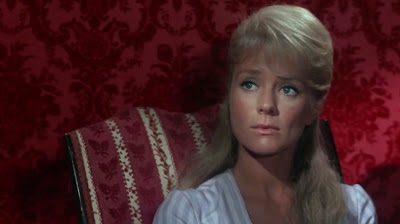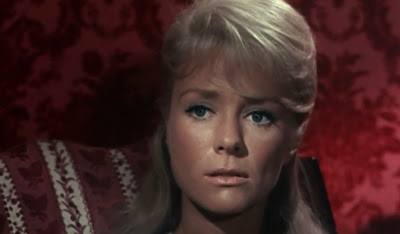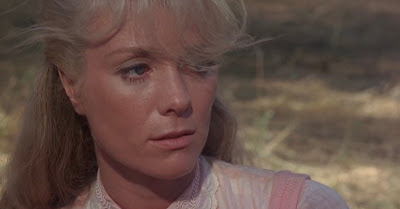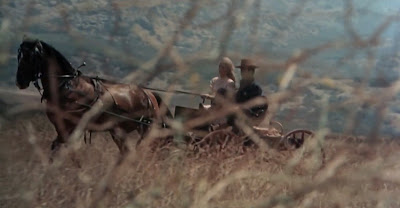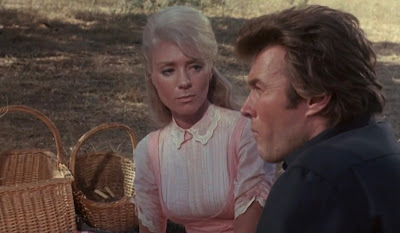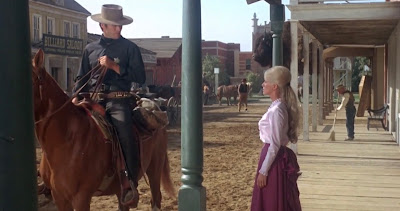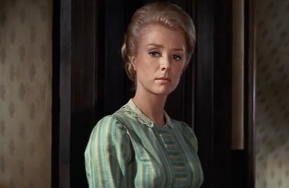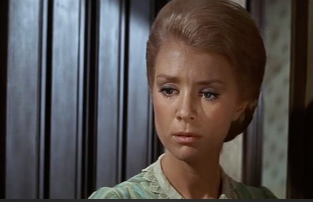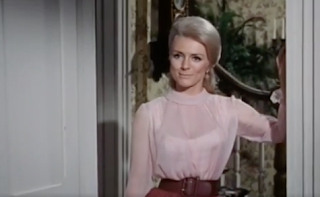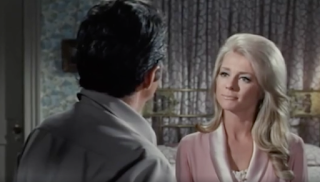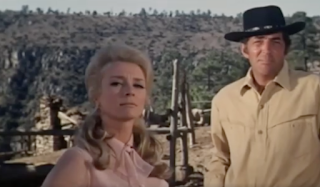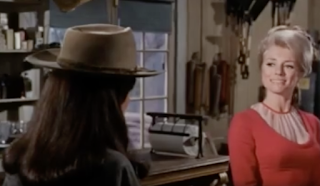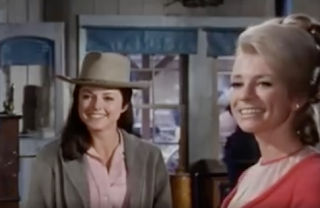 |
 |
| Inger (center) arrives in Reno. |
 |
| Inger examines the cowboy hats with Dan Blocker and Lorne Greene. |
There was much for the stars to do between the noon parade (in which Miss Nevada was none other than a 21-year-old Dawn Wells) and the eight o'clock premiere. After traveling in stagecoach from the State House, Inger headed north on Virginia Street to follow a route to Fifth then Sierra before the parade ended in front of the Riverside Hotel on the Truckee River.
 |
| Former actor-turned-politician, Rex Bell led the parade. Bell was married to actress Clara Bow. |
 |
| Although she is not visible in this poor quality photo, Inger is in this stagecoach shared with Yvonne DeCarlo. |
The celebrities were then whisked away for lunch in the Shore Room of the Holiday Hotel before touring the downtown stores—merchants had dressed their windows in western wear and theme for a Bonanza contest. By 5:00 p.m., Inger was meeting citizens and signing autographs at Powning Park. Dinner was at the Nugget in Sparks before entertaining the crowd again at the Granada Theater, where "The Newcomers" and "A Rose for Lotta" were screened for the public (adults only) free of charge.
RCA sponsored the premiere and RCA recording artist Vaughn Moore served as the emcee. Moore received a key to the city for his efforts.
 |
| Inger at dinner with the cast in Reno. |
 |
| Invisible except for the top of her blonde hair and lovely hands, Inger signs autographs beside Lorne Greene. |
After a day full of action, the cast and crew retired to their rooms at the Riverside, Mapes, and Golden hotels. On Sunday, they viewed the gun collection at Harold's Club before traveling back to Los Angeles on Sunday evening.
On Tuesday, August 25, the Today television show devoted a segment to the premiere footage. The massive publicity campaign, color episodes, engaging actors, and highly popular western genre would make Bonanza a hit for 14 seasons. Many don't realize that Inger Stevens was a major player in its initial publicity campaign and contributor to the show's success.
"The Newcomers"
Columnist Dwight Newton summarized the "The Newcomers" as “Inger Stevens…Camille on horseback.” And he's not wrong. Inger played many fragile, sickly or trauma-stricken characters between 1959 and 1962. However, Inger enjoyed freelancing on television and made light of the tragic string when she stated:Come to think of it, my TV career is beginning to look as if it were sponsored by Blue Cross. I was a nurse in the last Playhouse 90 I did. I play a tubercular in Bonanza. And in Twilight Zone I haven’t long to live.
 |
| Inger as Emily Pennington |
 |
| Inger studies "The Newcomers" script. |
They kind of apologized when they asked me to play it, because it’s a western. But I liked the script and it turned out so well that it will be released in Europe as a motion picture–if Paramount approves.
The episode can be viewed in full on Youtube (click here.) In it, Inger's Emily Pennington is the fiancé of prospector Blake McCall (John Larch), a man Emily's brother John (Robert Knapp) says "will do anything for gold." McCall believes there's gold hidden on the Cartwright company but is warned that mining for it will destroy the land. A man who was born without wealth, McCall believes he must make his fortune in order to keep up with the more prosperous Penningtons. Emily assures her fiancé that money means nothing to her and says:
Just give me a chance to get well and just give me a chance to be everything you want me to be.
Battling tuberculosis, Emily Pennington coughs frequently ("Can't you control that miserable coughing?" Blake barks at her. ) but doesn't reveal the gravity of her situation to Hoss (Dan Blocker). Hoss accompanies the Penningtons for protection and is hurt when she backs away from him in fear. Emily softens when she watches the gentle way Hoss brushes and speaks to his horse.
Emily: You really love horses, don't you?
Hoss: Oh, yes ma'am. I love all animals. You can trust 'em.
Emily: But you can't trust people?
Hoss: Well, I wouldn't say that. It's just that some folks have got a natural mean streak in them that animals just don't know nothin' about, I guess.
 |
| Inger with Dan Blocker behind the scenes. |


























